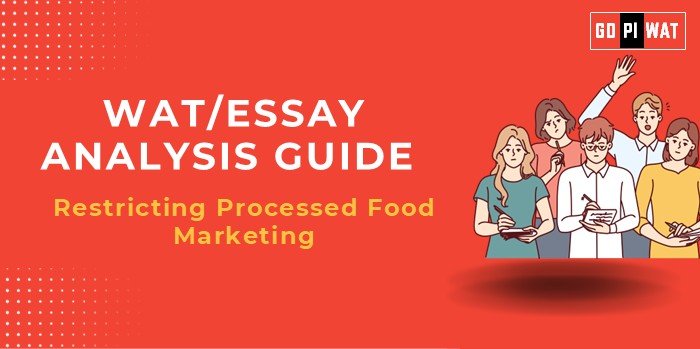📋 WAT/Essay Analysis Guide: Restricting Processed Food Marketing
🌍 Understanding the Topic’s Importance
Restricting processed food marketing is essential for addressing global health crises such as obesity and diabetes. It highlights the intersection of public policy, consumer behavior, and corporate responsibility—key themes for B-school discussions.
📑 Effective Planning and Writing
- 🕒 Time Allocation:
- ⏱️ Planning: 5 minutes
- ✍️ Writing: 20 minutes
- 🔍 Review: 5 minutes
- 📝 Preparation Tips:
- 📊 Gather statistics on obesity rates and advertising impact.
- 🌎 Note international success stories like Chile and Norway.
✍️ Introduction Techniques for Essays
- ✨ Contrast Approach: “While processed food drives convenience and revenue, its aggressive marketing to children raises public health alarms worldwide.”
- 💡 Solution-Based: “To address rising obesity rates, governments must regulate processed food marketing, fostering healthier choices.”
📖 Structuring the Essay Body
🏆 Achievements
Highlight successful examples (e.g., Chile, UK).
⚖️ Challenges with Comparative Analysis
- 💼 Discuss corporate pushback and economic implications.
🚀 Future Outlook
Suggest innovative solutions, like incentivizing healthier products.
🔍 Concluding Effectively
- ⚖️ Balanced Conclusion: “While marketing restrictions may impact industry revenue, their long-term benefits for public health are undeniable.”
- 🌍 Global Perspective: “Learning from Chile and Norway, nations can implement tailored strategies to achieve healthier societies.”
📝 Sample Short Essays
1. Balanced Perspective
“Processed food marketing significantly impacts consumer choices, particularly among children. While bans may curb obesity, they must be balanced with economic considerations to ensure equitable outcomes.”
2. Solution-Oriented
“Governments must regulate processed food marketing while encouraging companies to innovate healthier options, fostering a win-win scenario for public health and business.”
3. Global Comparison
“Chile’s success in reducing sugary drink consumption through marketing restrictions offers a blueprint for other nations to follow.”


